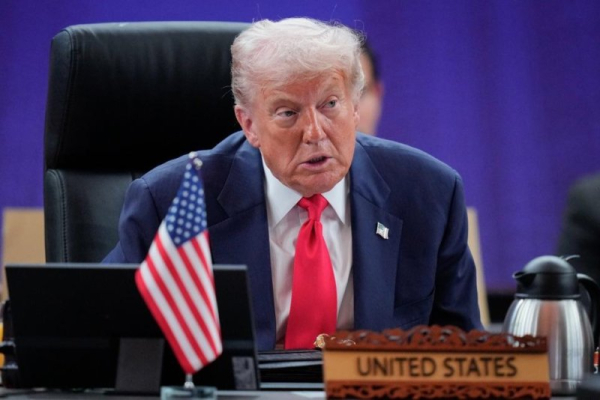Cambodia’s Trump Highway: the politics behind a name


U.S. President Donald Trump speaks during the Association of Southeast Asian Nations Summit at the Kuala Lumpur Convention Centre in Kuala Lumpur, Malaysia, on Sunday. Photo by Vincent Thian/Pool/EPA
Cambodia’s expected renaming of U.S.-built National Highway 4 — the 140-mile route linking Phnom Penh to the port city of Sihanoukville — after President Donald Trump is more than a nostalgic gesture.
The proposed “Donald Trump Road” signals Phnom Penh’s delicate geopolitical balancing act between Washington and Beijing.
At first glance, the move seems quirky or flattering — a tribute to Trump’s global profile and to his alleged role in brokering peace in Southeast Asia. But beneath that headline lies a layered message about Cambodia’s past ties with the United States, its present dependency on China and its uneasy effort to chart an independent path between two powers.
A friendship road revisited
Built by the 1960s with initial USAID support, the highway was originally dubbed the “Khmer-American Friendship Road.” It stood as a Cold War gesture of goodwill — a concrete link between the United States and Cambodia.
Half a century later, the same stretch connects vastly different realities. At its western terminus, Sihanoukville has transformed from a sleepy port into a Chinese-dominated enclave of casinos, construction projects and cyber-scam operations. What was once America’s legacy is now China’s domain.
This correspondent recalls driving that same highway in the late 1990s with a Cambodian princess and a Cambodian-American entrepreneur who had just restored a row of beachside bungalows in Sihanoukville — a moment that captured the optimism of a post-conflict Cambodia eager to reconnect with the world.
Those bungalows, like much of that hopeful era, no longer exist. Memory and modernity collide: the optimism once symbolized by beachside retreats has yielded to casinos, towers and syndicates.
Renaming the road “Trump Highway” may look like nostalgia for a lost U.S. connection — or, more strategically, a signal that Cambodia does not want to be seen solely as a Chinese client state.
Cambodia has a tradition of honoring foreign leaders through its infrastructure. Phnom Penh’s streets already bear the names of world figures such as Xi Jinping, Charles de Gaulle, and the Russian Federation — symbolic gestures that reflect the country’s diplomatic ties and geopolitical balancing act.
Between two powers
Prime Minister Hun Manet, in office two years, appears eager to distinguish his leadership from that of his father, Hun Sen, who ruled Cambodia for nearly 40 years. A simple act like renaming a road might seem trivial, yet it offers symbolic space for differentiation.
Trump’s name serves a dual purpose — a low-cost olive branch to Washington and a subtle reminder to Beijing that Cambodia retains agency.
“Building a sustainable relationship is needed to repair the trust gap which remains a critical obstruction to deeper cooperation between Cambodia and the U.S.,” claims Ambassador Pou Sothirak, a retired academic and distinguished senior adviser to the Cambodian Center for Regional Studies.
Local reaction across Cambodia has been largely supportive of renaming the thoroughfare “Trump Highway”. A government source suggested the timing could align with the ASEAN Summit through Tuesday in Kuala Lumpur, Malaysia, since Trump attended — offering what some officials see as a politically opportune moment for the announcement.
The idea, however, reflects a familiar pattern in Cambodian politics, where foreign figures often serve as symbols for the country’s broader national ambitions.
Some Cambodian commentators also note that the country’s parliament previously nominated Trump for a Nobel Peace Prize for his efforts in easing regional tensions. Whether that nomination carried real weight or not, the gesture points to Phnom Penh’s willingness to signal goodwill toward Washington even as Chinese influence deepens.
A tale of two roads
The old U.S.-funded highway now competes with a newer, Chinese-financed expressway between Phnom Penh and Sihanoukville — faster, smoother and under concessionary control.
Meanwhile, the port city at the end of Highway 4 tells a cautionary story. Reports of forced labor, money laundering and corruption have tarnished Sihanoukville’s reputation. Western analysts now describe it as “an enclave of Chinese-run casinos and cybercrime compounds.”
So, while the renaming may evoke U.S. friendship, the reality on the ground reflects Cambodia’s economic entanglement with China — and the governance challenges that come with it.
The contrast between memory and modernity could not be starker: what was once a road toward development and renewal now often serves as a corridor for capital flight, illicit trade and the erosion of local livelihoods.
Yet, symbolism has limits. Without genuine reform, better transparency or revived American investment, the gesture risks being seen as purely cosmetic — a political billboard on a road riddled with potholes.
Geopolitics in asphalt
Infrastructure often tells geopolitical stories more vividly than any policy statement. National Highway 4 once embodied America’s reach in Southeast Asia. Now, it illustrates China’s rise. Its proposed renaming captures Cambodia’s attempt to find equilibrium in an age of rivalry.
In the Indo-Pacific, smaller nations are not passive spectators. They use symbols — names, projects even highways — to assert choice and flexibility.
The irony is stark: A road built to represent U.S.-Cambodian friendship could soon bear the name of a president who often questioned the very idea of alliances.
Whether driven by flattery, calculation or quiet defiance, Phnom Penh’s road-renaming rumor reveals a country trying to steer through the crosswinds of great-power competition, one kilometer at a time.
In the end, whether “Donald Trump Road” becomes a reality or remains just another rumor, the story of Highway 4 endures — a reminder that in Southeast Asia, every road is political and every name carries a message about where a nation believes its future lies.
James Borton is a senior fellow at the Foreign Policy Institute at Johns Hopkins University’s School of Advanced International Studies and a UPI contributing columnist.